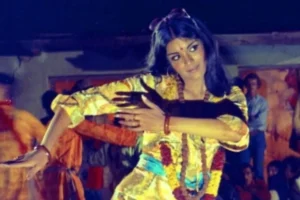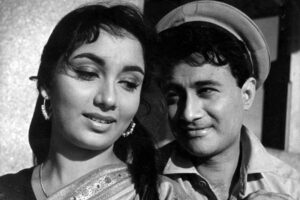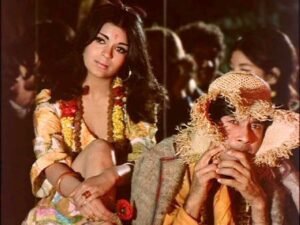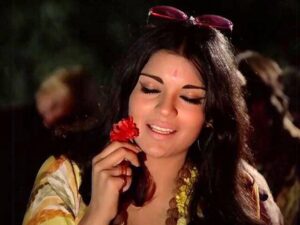Dum Maaro Dum : Zeenat Aman is widely regarded as one of Bollywood’s boldest and most beautiful actresses. With her fearless personality and magnetic screen presence, she dominated the 1970s and 80s. From Satyam Shivam Sundaram to Hare Rama Hare Krishna, Zeenat redefined glamour and charisma in Indian cinema. She starred alongside legendary actors such as Rajesh Khanna, Dharmendra, Dev Anand, Jeetendra and Shashi Kapoor, creating an unforgettable legacy.

While many of her songs became timeless superhits, there is one iconic track that sparked massive controversy and was banned by the Indian government. This song was none other than the cult classic “Dum Maaro Dum.”
A Song That Shocked the Nation 54 Years Ago
Released in 1971, Dev Anand’s hit film Hare Rama Hare Krishna featured Zeenat Aman, Dev Anand and Mumtaz in leading roles. Dev Anand not only starred in the film but also directed, produced and wrote it himself. The movie was a massive box-office success and remains one of Dev Anand’s most influential films.

The soundtrack of the film became equally iconic, with songs like:
-
“Dum Maaro Dum”
-
“Phoolon Ka Taron Ka”
-
“Kanchi Re Kanchi Re”
Even today, these songs are a staple in Bollywood playlists. “Dum Maaro Dum” especially achieved cult status. Its remixes have been recreated several times, including the 2011 film Dum Maaro Dum, where the modern version was picturized on Deepika Padukone.

The original soundtrack was composed by the legendary R.D. Burman, with lyrics written by Anand Bakshi. But among all the songs, it was “Dum Maaro Dum” that became an overnight sensation as well as a topic of heated debate.
The Controversy Behind “Dum Maaro Dum”
The song, filmed on Zeenat Aman and Dev Anand, portrayed the hippie culture of the 70s. Zeenat’s bold look, carefree dancing style and the song’s rebellious theme were unlike anything Indian audiences had seen before. The track quickly became a rage among the youth.

However, the song also drew criticism from conservative groups and the political establishment of the time. Its references to drugs, free-spirited youth culture and rebellion were considered “too bold” for Indian society during that era.
As a result, the Government of India imposed a ban on the song shortly after its release.
Despite the ban, “Dum Maaro Dum” continued to grow in popularity through audio records and underground screenings. Over time, it evolved into one of the most iconic songs of Hindi cinema, representing a unique cultural moment in Bollywood’s musical history.
